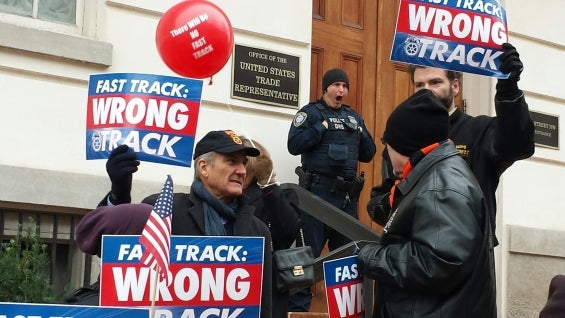Headline News
Hoffa: What America Needs From Its Trade Pacts

By Teamsters General President James P. Hoffa
Published in the Detroit News, May 13, 2015
The U.S. Senate has decided, for now, not to put the Trans-Pacific Partnership on the fast track. That’s a good thing. This issue deserves a full debate.
Fast track trade authority is would allow bad trade pacts like the Trans-Pacific Partnership (TPP) to sail through Capitol Hill with little debate and no chance to be amended. Thousands of Americans would see their jobs shipped overseas, and many more would see their wages drop. In return, our homes would be flooded with unsafe food and products from abroad.
Michiganians know all too well the high cost of previous trade deals. Luckily, there are some elected officials who are on the side of workers. Congressman Sandy Levin, D-Royal Oak, the senior Democrat on the House Ways & Means Committee, is one of them, standing up to big business interests who have been pushing for more of the same when it comes to trade.
Instead of going along with those efforts, Levin is blazing his own path. He’s offered legislation that would make TPP negotiators accountable to Congress as they work out all of the outstanding issues on TPP, and would not allow the deal to be expedited unless a bipartisan collection of House and Senate trade advisers determined instructions have been followed.
A bipartisan buy-in for trade deals is essential, because there is little of that with the current version of fast track. Enough Senate Democrats voted no to stall the legislation for now. Why? Because there are plenty of problems with TPP that fast track wouldn’t allow to be fixed.
Take currency manipulation. Other nations adjust the value of their money so their exports will be cheap and Americans will want to buy them up. The flip side of that is it drives up the prices of U.S. products in those countries. This is exactly what we’ve seen with the auto industry. American cars are extraordinarily expensive in many places overseas because of this. And that costs jobs. Michigan is number one in job loss due to Japanese currency manipulation.
There are also significant bipartisan concerns involving the investor state dispute resolution process. As WikiLeaks reported back in March, language included in the Investor State Dispute Settlement chapter of the TPP would grant new rights to companies to challenge copyrights, patents and other intellectual property. That means corporations could sue the U.S. or other countries included in the deal if they didn’t like their laws. Such challenges would be handled by an unaccountable international arbitration forum. And taxpayers would end up paying the tab if the private sector wins.
And the 12-nation Pacific Rim trade agreement could also end the Buy American program, a more than 80-year-old federal procurement vehicle that gives U.S firms a leg up in securing federal government contracts. The secretive TPP could allow foreign companies to compete for the tax dollars of Michigan residents.
None of these are partisan issues. But they are significant issues for many Americans. They need to be addressed by congressional leaders now, before it’s too late.